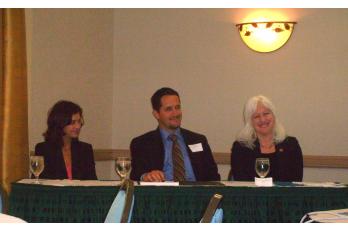Professor Bisom-Rapp Speaks at SD LERA Dinner
May 19, 2011
Professor Susan Bisom-Rapp was one of three featured speakers at the May 18th dinner meeting of the San Diego Labor and Employment Relations Association (LERA), addressing the Challenges of Social Media in the Workplace.
“Social media, like Facebook, implicates employee speech in two important ways,” said Professor Bisom-Rapp. “First, social media facilitates speech that is expressive in that it allows employees to construct an online identity. The expressive part of employee speech is frequently dealt with under privacy law.”
“But social media,” she continued, “also enables speech that is associational in that it provides a forum for community building and networking. In the US, the associational aspects of social media are being analyzed by the National Labor Relations Board (NLRB) under the National Labor Relations Act, which protects the rights of unionized and non-unionized workers to discuss their terms and conditions of employment. Such actions are considered protected, concerted activity.”
“Interestingly,” noted Professor Bisom-Rapp, “although a number of aspects of US labor law fall short of international standards for worker freedom of association, the NLRB’s Acting General Counsel is laying a foundation for the Board to be in the international vanguard on employee speech and social media. The stage is being set for the NLRB to issue decisions that fashion a protective, worker-sensitive set of rules for analyzing online employee speech and employer rules that would limit it.” This seems to be in contrast to early cases in France and the United Kingdom, where employee dismissals for Facebook postings have been upheld when analyzed under privacy law and freedom of expression.
Also speaking at the event were Ricardo Ochoa, who practices union-side labor law at Hayes & Cunningham, LLP in San Diego, and Yvonne Arvanitis Fossati, a partner in the Los Angeles office of Jackson Lewis, who represents employers. Mr. Ochoa and Ms. Fossati discussed recent case law, and offered suggestions for navigating this developing area of the law.
